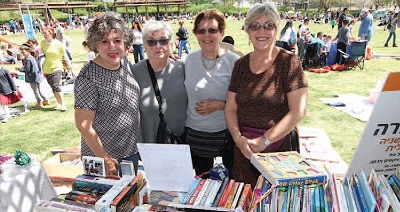
ESRA Modiin had a book sale at a pre-Pesach flea market in the city’s Fish Park. Manning it were (from left) Bonnie Bachenheimer, Hinda Auerbacher, Jackie Klein and ESRA Modiin Chair Cynthia Barmor Photo: Anthony Green
Direct debit orders? On-line banking? Caveat emptor
Service providers beg us to make our lives easier with online services or apps that save us a trip to the bank, a wait in line, a call to the health fund - even a chance to “save a tree” by not printing out that document. We don't even have to pay bills anymore – just sign a Direct Debit order and the bank will do the rest. We can do it all without leaving the comfort of wherever we happen to be.
Why should the company/entity/whatever work so hard to save our time and money? Because it saves them money; by not dealing with the public face-to-face, they save on postage, phone bills, salaries and - often enough - rent money for closed offices. These services may be more 'convenient,' but they also make us and our money more vulnerable.
While temping at a bank, I learned how easy it was to charge an account with a Direct Debit order for unsolicited services or overages – and how hard it was to get the money back. When my late husband died, the mobile provider continued to make 'service' charges even after I returned the rented phone and showing them a death certificate. As for utilities.... I recently helped someone get a refund for a grossly misreported overcharge.
When I had to have a Direct Debit order to change health funds, I opened a separate Postal Bank account only for that, and even then a problem arose when the HMO offered to charge the account for quarterly doctor's visits and medications, instead of having to pay cash. I refused the service, so imagine my shock when I discovered they were doing it anyway! I steamed into Administration and demanded they cancel it.
“But you signed the form!” the clerk told me.
“Prove it!” I shot back, and waited patiently while they found the unsigned form in the archive. They cancelled.
So when it comes to doing business on-line, for one thing, you have to accept whatever conditions go with the service. For another, no matter how secure the service providers' computers and links, there is NO guarantee the information from your device can't be monitored by a third party.
Going 'digital' makes it easy for criminals somewhere on the planet to steal your identity: bank accounts, investment records, credit cards, images, diaries, medical history, family genealogy, your latest horoscope, and all media accounts! It has happened and is happening all the time.
It's called Identity Theft, and 17.6 million US citizens experienced it first hand in 2015.
“Eleven countries with the highest rates of identity theft in the world are a strange mix of wealth and poverty, but they have a few things in common. All have strong economies and citizens who prefer to do their banking online, leaving enough trails for hackers to pick up and steal their identity. Since it can take several months before the victim discovers what has happened, the damage is often done long before the police get involved.” www.insidermonkey.com
The countries are: Australia, Brazil, Canada, China, India, Mexico, Singapore, South Africa, the UAE, UK and USA.
(By the way, the Sochi Winter Olympics in 2014 proved to be a 'hackathon': Russian hackers demonstrated their abilities, hacking any device that attempted to use local Wi-Fi.)
So call me a reactionary, but when someone offers me an on-line service I tell them “No, thanks.”
In the words of Nero Wolfe: “Bah! Phooey!”
Tweeted on the Forbes article: Is The U.S. Economy Going To Crash This Year?
“So much of trading and investing is learning to be uncomfortable with uncertainty.”
Siri Jones Rosen, Eilat
Writer’s been mixing his drinks!
A couple of articles in the last issue #189, of your excellent magazine, caught my eye.
The first was the item on smoking, the second the one on Scotland.
I am amazed at the number of people who smoke here in Israel, without a thought for their own, for others and particularly their children’s health. Where is the education about the dangers of smoking that is so abundant in other countries? Can Dr Maisel give any figures on the percentage of deaths in this country from passive smoking? I fear it is high.
Usquebaugh in Scottish Gaelic or Uisge beatha in Irish Gaelic means “water of life,”
Ish Ki bar is the nearest pronunciation. The words whiskey and whisky are derived from this. The writer of the article Scotland the Rave, Eli Libenson, had what sounds like a wonderful trip, but may I point out that no self-respecting Scotsman or woman, would drink whiskey! This is the Irish not the Scottish spelling.
So whatever you're drinking, Slainte, Cheers, L'chaim.
Laurette Pearlman, Netanya
Tribute gave us opportunity to express thanks to Jackie
Dear Cynthia,
Thank you and your committee for organizing such a beautiful tribute to Jackie where we could formally thank her for her many contributions to ESRA. I joined ESRA before actually making aliyah. I joined at the luncheon at the Solomon Center, because I was so impressed by the women who were there and knew I wanted to be part of the organization when we came. I have not been disappointed and am particularly happy to be participating in the English programs at Keshet and both Amit high schools where I get a great deal of satisfaction interacting with the teachers and students. I have also benefited from the Let's Talk program. I am grateful that you and Jackie have given so much to the success of the organization and thus provided me with ways to participate and meet a lovely group of extremely talented women.
May you continue to grow from strength to strength.
Barbara Wirtschafter, Modiin
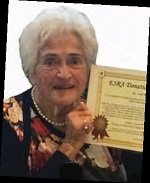
Leah Hyman ... featured in last issue
Benoni boy renews friendship with Leah after reading profile
I simply love nostalgia and as a Benoni boy I went into action immediately after reading the article by Judy Lev on Dr. Leah Hyman (nee Civin) who was born in Benoni! I phoned her and we had a good chat reminisced about old times and needless to say, with her prodigious memory, we spoke about my sisters, and school and the leading lights in the Benoni community. We reminded each other of so many people and shops and places. I have sent the article to my sisters and family.
Thanks for printing it
You made my week!
Hertzel Katz, Herzliya
Friends in appeal for memories, photos and your stories
SA Friends of Beit Hatefusoth is calling for memories, photos and anecdotes.
For the past 24 years, a project of the SA Friends of Beit Hatefutsoth has been to research and record the history of the Jewish communities in the towns and villages of South Africa. It has been a fascinating journey for the small team of researchers and staff involved. Information on over 1540 places has been captured on computer!
To date, five books have been published with two more to follow. The completed series will cover every town, village and farming community where there was once a Jewish presence. These books have been very well received by local and ex -South Africans worldwide.
At present, we have a website – www.jewishcountrycommunities.co.za. This gives the background to the project and an example of one small town in each book. Many of the town records in the published books are huge. We aim at including a record of every Jew who lived in the town, where they came from, and when, and their occupation. This series highlights the incredible contribution made by the Jews to the development of South Africa.
A great deal of this information comes from the invaluable archives at the SA Jewish Board of Deputies, among many other sources, but it is the memories, photos and anecdotes that add a more personal dimension to this history.
If any of your readers, or their families, once lived in one of these places, their input would be much appreciated. New information on areas already published will be added to the database, which will eventually be on the internet.
Please contact us by email at museum@beyachad.co.za with information, queries or book orders.
Adrienne Kollenberg, Co-chairman, South African Friends of Beit Hatefusoth Sandringham
After that wonderful appreciation, time to form a Primo Levi circle
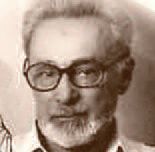 Congratulations on carrying the very interesting (and highly informative) article on Primo Levi by Elizabeth Levi Senigaglia of Tiberias (189 issue, April 2017). Ms. Senigaglia has penned a penetrating portrait of Primo Levi and his works.
Congratulations on carrying the very interesting (and highly informative) article on Primo Levi by Elizabeth Levi Senigaglia of Tiberias (189 issue, April 2017). Ms. Senigaglia has penned a penetrating portrait of Primo Levi and his works.
By appending Levi's poem “Shema”, she reminds us of the implied imperative of Levi's words: “Consider if this is a man…” This is more a command than a request (“I command these words to you”). Which words? Words which admonish us to act and sanction failure to do so:
“Engrave them in your hearts
…Repeat them to your children,
Or may your house fall apart,
May illness impede you,
May your children turn their faces from you.”
As Harold Jacobson has written:
“The danger, as time goes by, is that we will tire of hearing about the Holocaust, grow not only weary but disbelieving, and that out of fatigue and ignorance more than cynicism, we will belittle and, by stages, finally deny – actively or by default – the horror of the extermination camps and the witness, by then so many fading memories, of those who experienced them. The obligation to remember is inscribed on every Holocaust memorial, but even the words “Never Forget” become irksome eventually. Again and again, Primo Levi’s work is described as indispensable, essential, necessary. None of those terms overstate the case…”
To fellow readers: Assuming no Primo Levi circle exists, which appears to be the case, are there readers willing to get together to form one? If so, kindly contact me.
Gabriel Glazer, Ramat Hasharon
Was the author depressed ‘before’ the Holocaust?
Thanks to Elizabeth Levi Senigaglia for her moving piece about Primo Levi. She packed a lot into a concise article.
I read many of his books when they were translated into English. The Holocaust has interested me since I first became aware of it, as a young child.
In high school, a classmate was a third generation survivor of the Armenian Holocaust, and later, when I was treating our Holocaust survivors and their children and grandchildren, I remembered her and noticed the similarities between her suffering and those of these patients I treated.
I have not read any biographies of Primo Levi. I wonder if he was depressed before the Holocaust. I am reminded of Iris Chang, who vicariously “lived” an atrocity when she researched and wrote The Rape of Nanking.
Just as I wonder how much Primo Levi's depression and suicide were a result of his experience in Auschwitz and how people reacted after he came home, so too I wonder to what extent her depression and suicide was a result of her vicarious suffering for what happened in Nanking.
Again, thanks to Elizabeth Levi Senigaglia.
Judith Ronat M. D. Kfar Saba
Thank you, ESRA Community Fund, for your life-saving generous donation
To the Generous Donor,
I don’t know where to begin to thank you.
I have had years of stress and debts upon debts. This is something that has always followed me in my life. There were few times that I could relax and have money for myself, not just for repaying my debts.
I was a bit afraid to begin my studies due to the accumulation of debts, but in the end I did because I always believed G-d would give me my needs and if I needed more, he would also provide. My belief never left me and I was always sure that everything will be OK. I just had to continue to believe that things will work out.
I never told a soul about my debts; only my immediate family knew. I didn’t tell anyone else because I didn’t like to ask for anything. I always love to give, which is the way I was brought up at home.
During the past year, I have learned to speak about what is troubling me and not to be afraid to ask for help when it is needed so when I joined the amazing ‘Students Build a Community’ project in Netanya, I felt at ease telling my coordinator about my personal problems. She immediately directed me to the ESRA organization, a warm and loving place, which is always ready to help when needed.
I don’t know who you are Generous Donor, but I hope that G-d will bless you for your large donation and that you will have peace and good health so you may continue to do good for others.
Thank you very much from the bottom of my heart. I appreciate and cherish your help and, of course, a huge thank you to ESRA for your willingness to help me.
Orit, Netanya
Merci - grant came at the right time
I am a new immigrant from France. Many, many thanks for the NIS 2,000 grant you sent me. it helped me tremendously and came at a moment when I very much needed it.
Johanna Lea S., Netivot
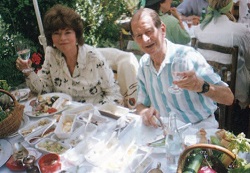
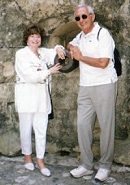
Lunch ... Sheila and Eliezer Ottensooser at the Golden Dove Restaurant, Cannes. Right: Sheila Ottensooser with Mike Rubin at the entrance to St Paul de Vince in 2001
60-year friendship resulted in a generous bequest to ESRA
Sheila Ottensooser died in August 2015 and Richard Stein, former Chairman of ESRA, attended a memorial service for her in London as a representative of ESRA.
This gift came about as a result of the friendship I (a former chairperson of ESRA) and Mike, my husband, had with Sheila and Eliezer Ottensooser for over 60 years, first in Israel and then abroad. We were at their son Gavriel's brit at the Sharon Hotel where Eliezer was deputy manager in 1956. Our son, Ilan, who was born a few months later became Gavriel’s friend till Gavriel died of cancer a few years before his parents retired and moved to Cannes France.
We often visited the Ottensoosers in England where Eliezer (who came from a well-known German banking family) became a very successful Insurance Broker. We went to London in 1999 for Gavriel’s memorial service.
We also visited Sheila and Eliezer in Cannes soon after they moved, and as usual we had a wonderful time with them. Unfortunately Eliezer died suddenly soon after.
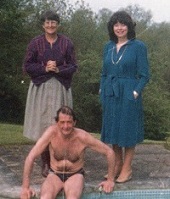
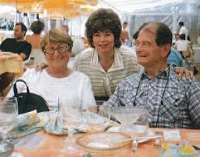
We kept in touch with Sheila and tried unsuccessfully to encourage her to come to a retirement home in Israel as she was mostly confined to bed with a bad back. I occasionally sent her the ESRA Magazine and then, at my request, Brenda Katten,
who had met the Ottensoosers in London, arranged that ESRA regularly send Sheila the magazine. Through reading the magazine, Sheila became interested in ESRA and its projects, including what we were doing in Sderot.
We knew little about the bequest although in one of her regular monthly conversations with Mike, Sheila asked if ESRA was still functioning and said she was considering including it in her will.
We are proud and pleased that our friendship and staying in contact over many long years have borne fruit.
Adele and Mike Rubin, Sderot
Israeli Postal Bank welcomes foreign workers to open currency accounts
The Israel Postal Bank, in conjunction with EuroGiro and Western Union, has published a brochure in English entitled "Welcome To Israel" to encourage foreign workers to open low-cost shekel and foreign currency Postal Bank accounts. The brochure details rates, conditions and transfer services offered and has this interesting information:
"Please note, your employer is obliged by Israeli law to transfer your salary to a bank account held and managed under your name only.”
"Your employer is required to transfer your salary to your bank account in Israel so you can be the master of your money."
Important information for employers as well!
The brochure can be found at Postal Bank foreign currency windows ... which is where I found it.
Siri Jones – Rosen, Eilat
Barbara’s art must be seen – not just written about
 Lynette Karp did an excellent journalistic profile of Dr. Barbara Blum in the April/May 2017 issue of ESRAmagazine. We enjoyed reading about our friend Barbara.
Lynette Karp did an excellent journalistic profile of Dr. Barbara Blum in the April/May 2017 issue of ESRAmagazine. We enjoyed reading about our friend Barbara.
The mere mention of Barbara's stained glass art does an injustice to ESRA's readers without showing an example of Barbara's magnificent stained glass talent.
Leonard C. Kahn, Zichron Yaakov
Refreshing Low-Cal and No-Cal summer coolers
■Add 2-3 drops fresh lemon juice to a glass of water to make it taste 'sweet' and quench thirst
■Sweet & Sour cocktail: 1⁄3 cranberry juice, 1⁄3 pink grapefruit juice and 1⁄3 water. Add ice and stir
■Peel and cut a wedge of pink grapefruit into bite-size chunks and add to a big glass of cold water for citrus flavored water every time the glass is refilled. Or nibble the fruit. A little cranberry juice works here too.
■Add soda water to 1⁄4 to 1⁄3 of a glass of cranberry juice - and watch out for the fizz!
■One bag of green tea, with lemongrass & verbena or mint & chamomile, will make two liters (8 cups) of a light tea. Boil water and brew in a pitcher for 3-5 minutes only (over-brewing and/or squeezing the bag will make it bitter). Let cool and refrigerate. No sweeter needed, and may be diluted to taste.
Just as we say beteavon (bon appetite) when eating, the Hebrew word to wish someone to drink their fill is “lir-vaiyah.” So... lir-vaiyah!
Siri Jones-Rosen, Eilat
I want to make aliyah, but I’ve lots of questions I need answering
Thanks for an interesting magazine eagerly anticipated each quarter.
I used Lisa Brink’s recipe for Chicken Marbella very successfully and it was well received. It’s becoming my signature “bring your chicken” recipe.
I do wish someone would start a column about folks who’ve made aliyah. Wanting to be one myself – what happens? What do you need? What is not needed? I have studied Hebrew but am not fluent. Can you be too old? Can you do it alone? How much money is needed? Do you become a street person upon arrival? Who else can I ask?
Dinah Haberthier, Rockvale, Colorado, US
Apologies for case of mistaken identity
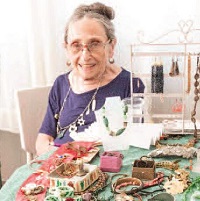 APOLOGIES for the error in ESRA magazine #187 in naming this volunteer who was manning a stall at ESRA Fair in Netanya.
APOLOGIES for the error in ESRA magazine #187 in naming this volunteer who was manning a stall at ESRA Fair in Netanya.
I was sad to hear about Helene Magid Halle’s death, but happy to read the wonderful and well deserved obituaries about her by Merle Guttmann and Adele Hunter in ESRAmagazine189.
I was most touched to see the photo of Helene and me. It’s true we volunteered together for ESRA and we both lived in Herzliya – but we also grew up in the same suburb of Cape Town – Sea Point. I remember the family. Her younger brother was the same age as my sister Ruth. Helene came to Israel in1950 and me in 1951 but we only met up through ESRA. All the best to her family.
Adele Rubin, Sderot
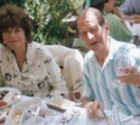 The Ottensoosers
The Ottensoosers Advertisers Directory 190
Advertisers Directory 190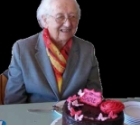 Milestones 190
Milestones 190-1536952992.jpg) Happy times of Shirley at Jockey Club
Happy times of Shirley at Jockey Club-1452334275.jpg) We've got Mail
We've got Mail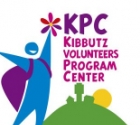 Connecting with your Kibbutz volunteer friends
Connecting with your Kibbutz volunteer friends Writer
Writer